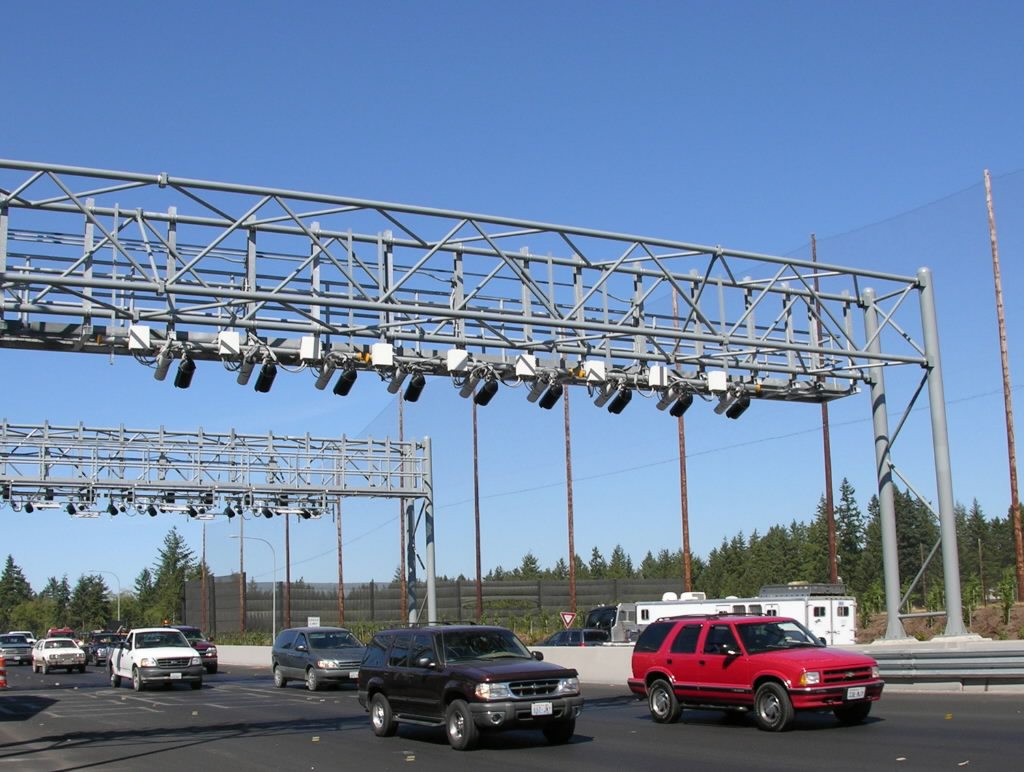Feds give green light to Columbia River Crossing
To take the statewide survey on transportation funding and to join an ongoing transportation panel, visit Voice of Washington Survey
After a long delay, tolling on the Highway 520 floating bridge across Lake Washington will begin at 5 a.m. Dec. 29, officials said Wednesday.
The Washington Transportation Department plans to use tolls to help pay for a new floating bridge on Lake Washington that will cost more than $4 billion. Pontoons already are under construction for the replacement of the 48-year-old bridge with a new six-lane bridge.
Officials say the bridge could be damaged during earthquakes and severe windstorms. It spans the lake from the University District in Seattle to Bellevue, carrying about 500,000 vehicles every day.
The bridge will be the first in the state with all-electronic tolling, rather than cash-collection tollbooths. The system allows tolls to be collected at highway speeds through windshield stickers or through license-recognition photos, which automatically generate a bill that is mailed to drivers.
The toll rates will vary depending on traffic, costing up to $3.50 during the peak commute. The toll will be automatically deducted from prepaid accounts of drivers with a “Good to Go” transponder. Other drivers will be mailed a bill with a $1.50 surcharge.
A new statewide survey found that every region in Washington supports using tolls to pay for big transportation projects — every region, that is, except Southwest Washington.
Released Wednesday by the Washington Transportation Committee, the survey shows tolls have favor from 59 percent of 5,518 respondents — a funding mechanism expected to cover about one-third of the $3.1 billion to $3.6 billion price tag on the Columbia River Crossing project.
But just 43 percent of respondents in Southwest Washington said they like tolling as a way to pay for big projects, trailing next lowest supportive region, Benton-Franklin-Walla Walla, by 10 percent.
The study — sent to 10,000 residents in balance with the state’s demographics — also found majority support for toll prices that go up in peak hours (62 percent) and for “raising some transportation taxes and fees” (59 percent), according to the Washington Transportation Commission. Both those topics proved unpopular here.
Tim Schauer, Clark County’s local representative on Gov. Chris Gregoire’s Connecting Washington Task Force, tasked with piecing together recommendations on ways to create stable funding for the state’s struggling transportation budget, said the right questions haven’t been asked to local residents.
Tolls are a user fee, and transportation projects have to be paid for somehow: If it’s not tolls, it could be a higher gas, sales or property tax, he said.
“We don’t support tolls (here), but we haven’t really done a good job of presenting people choices,” Schauer said. “Clark County needs an education on if not tolls then what?”
Yet statewide, when the survey asked about specific taxes and fees, enthusiasm flagged.
Washingtonians threw their weight behind just three of nine specific new or increased taxes or fees: Sixty-one percent support a vehicle emissions fee; 60 percent support a special license fee for electric vehicles; and 52 percent support tolls. About half (46 percent) support an increase in the state gas tax.
Still, Schauer said, people respond positively to paying more if they know they’re going to see benefits.
“I think the public is ready to pay for additional transportation improvements,” he said. “But they’re going to be very careful and very intelligent about how that money gets spent.”
The results of the survey will help lawmakers as they consider a transportation package expected to come from Gregoire as soon as this spring, said Reema Griffith, executive director of the state transportation commission.
“The Legislature is going to take all these inputs, and the (Washington Department of) Transportation issues priority project list, and put them together,” Griffith said. “They’ll have a lot of information before them.”
The survey results will be presented as part of the commission’s monthly meeting, set for Tuesday and Wednesday at the state Transportation Building in Olympia. The commission will also set the tolling rates for the CRC. Briefings and updates on the CRC will be on the agenda.
After a long delay, tolling on the Highway 520 floating bridge across Lake Washington will begin at 5 a.m. Dec. 29, officials said Wednesday.
The Washington Transportation Department plans to use tolls to help pay for a new floating bridge on Lake Washington that will cost more than $4 billion. Pontoons already are under construction for the replacement of the 48-year-old bridge with a new six-lane bridge.
Officials say the bridge could be damaged during earthquakes and severe windstorms. It spans the lake from the University District in Seattle to Bellevue, carrying about 500,000 vehicles every day.
The bridge will be the first in the state with all-electronic tolling, rather than cash-collection tollbooths. The system allows tolls to be collected at highway speeds through windshield stickers or through license-recognition photos, which automatically generate a bill that is mailed to drivers.
The toll rates will vary depending on traffic, costing up to $3.50 during the peak commute. The toll will be automatically deducted from prepaid accounts of drivers with a "Good to Go" transponder. Other drivers will be mailed a bill with a $1.50 surcharge.



